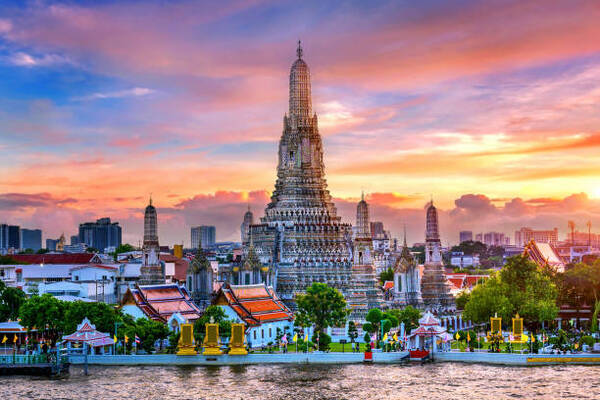≡-Thailand Emerges As Southeast Asia’s Remote Work Capital As DTV Visa Completes One Year With Strong Demand And Community Transformation – Viral of Today
<> Viral of Today <>
Home » THAILAND » Thailand Emerges As Southeast Asia’s Remote Work Capital As DTV Visa Completes One Year With Strong Demand And Community Transformation Sunday, July 13, 2025Thailand’s Destination Thailand Visa (DTV) has been a historic hit one year since its launch, having attracted over 35,000 applications and revitalized the country’s economic and tourism sector. Established to lure digital nomads and remote workers, the visa has, apart from kickstarting post-pandemic travel, fostered new long-term communities across the islands and towns. Its flexible design and way-of-life appeal have propelled Thailand to become the global leader in remote work destination, and it’s a shifting paradigm in the country’s foreign economic growth and tourism thinking.Since debuting in July last year, the Destination Thailand Visa program has already drawn interest from over 35,000 applicants.Following the sale of a Philippines-based fintech start-up, a French-Canadian founder applied an in-depth spreadsheet to assess Southeast Asia’s top locations for remote work. His research eventually resulted in Bangkok being the best location to settle down in.Drawn by Bangkok’s affordable healthcare, strong infrastructure, and vibrant city life, the founder moved to the Thai capital in 2023. He subsequently qualified for the Destination Thailand Visa (DTV), an extended stay scheme launched to lure digital nomads and boost the country’s post-pandemic economic recovery.Since its launch on July 15 last year, the DTV has seen 35,000 plus applications, based on official data—representing quite an accomplishment for an administration struggling with continuing political setbacks and lackluster economic momentum.Across Bangkok and beyond Thailand, the introduction of the new long-stay visa category is reshaping regions that previously concentrated on short-term tourism. These areas are transforming into remote work centers, with their culture revolving around co-working centers, Muay Thai training centers, spas and wellness retreats, and locally owned coffee shops.The Destination Thailand Visa (DTV) of Thailand has become an exception during an otherwise challenging economic environment. The World Bank has recently lowered the nation’s 2025 growth estimate from 2.9% to 1.8% due to an array of decreasing exports—fuelled by trade tensions with the United States—continuing political ambiguity, and weak recovery among the tourist markets.Tourist arrivals, particularly from China, have seen a notable decline. Heightened safety concerns, fueled by reports of scams and kidnappings, along with tighter household budgets due to economic strain, have caused many would-be visitors to rethink their plans. As a result, Thailand has revised its full-year tourist arrival forecast downward from 39 million to 35.5 million.Amidst this recession, remote workers and digital nomads have become all the more significant, particularly in regions that get fewer visitors during the wet season of Thailand from July until the end of September. They provide a steadier, year-round boost to the economy and sustain regions beyond the usual tourist centers.The DTV, which was introduced under the existing Pheu Thai-led government, is a more appealing and flexible option compared to the counterparts in neighboring countries. Though Malaysia and Indonesia too provide visas designed with remote workers in view, their programs usually enable the foreigner to remain for a one-year maximum—non-renewable is Indonesia’s offering. Thailand’s DTV, meanwhile, allows multiple entries within the five-year validity, with the individual’s stay being maximum 180 days each time. It is available to candidates 20 years and older with freelance or remote employment with foreign companies, and it permits the candidate’s wife/husband and children to join them too.While the country is still struggling with political turmoil—another setback arriving with the suspension of its primeminister—its hopes for long-term economic stability lie with the rising foreign long-stay community. The DTV program is in line with Thailand’s evolving image as an online-enabled home base among creatives, entrepreneurs, and telecommuters looking to balance workplace efficiency with wellness, cultural exploration, and exploration of the outdoors.From co-working cafes in Chiang Mai to beachside studios in Phuket, the country is positioning itself as an ideal backdrop for the work-from-anywhere generation. By appealing to this demographic, Thailand hopes to stimulate economic growth, diversify its visitor base, and reduce its overreliance on short-term mass tourism. Thailand has a strong remote ecosystem, with anything from Bangkok’s modern co-working centers and fast internet to seaside villas and secluded jungle bungalow lodges, and all of them offered on an extensive range of budgets. The nation has gone so far as to customize its Destination Thailand Visa (DTV) with the option of studying Muay Thai, combining culture and long-stay stays.Thailand’s remote workers are able to efficiently run their foreign businesses from the country’s vibrant city centers like Bangkok with vibrant community life and enjoy an efficient remote work setup with good digital infrastructure, but one area of drawback lingers: the DTV holders are barred from opening their domestic banking accounts.It is due to attempts to fight financial crime and discourage unauthorized work in industries reserved for Thai citizens. Though the policy has a protective role, it poses practical inconvenience to genuine digital nomads, as they might struggle paying bills or making normal transactions via domestic QR-based systems—causing unnecessary paperwork and dependence on foreign accounts.Still, for many remote workers, Thailand’s balance of modern amenities, cultural depth, and affordability outweighs the inconvenience, making it a top destination for those embracing the work-from-anywhere lifestyle.Bangkok beckons to remote workersAlthough there are more affordable places across the region, Thailand’s appeal is significantly enhanced by its exceptional connectivity within Southeast Asia.With their digital nomad visas in hand, the Sius have made Thailand their home base while broadcasting travel live streams from various destinations throughout Asia.Adjustment doesn’t come easily for everyone, as shared experiences within Bangkok’s expat circles reveal challenges faced by some remote workers—ranging from difficulty maintaining focus to falling into unhealthy habits amid the city’s many temptations.For others, the DTV has brought new possibilities and fostered an active, like-minded community of long-term foreign residents.Koh Phangan, which used to be renowned almost exclusively for its energetic, booze-fueled full moon parties, is witnessing an evolution in its long-term clientele. The increase in remote workers has changed the island’s image, with wellness professionals, online freelancers, and travelers from all ranges of age and profession coming to the island. Unlike short-term travelers, digital nomads frequently rent houses or apartments from Thai home-owners, engaging deeper with the community. They go to neighborhood cafes, learn Muay Thai and yoga, and participate in community events and gatherings actively.Tags: Bangkok remote workers, co-working in Thailand, Destination Thailand Visa, digital nomad visa, digital nomads, DTV anniversary, post-pandemic tourism, remote work, southeast asia, thai tourism, Thailand
This information will surprise you!
See also
- Read until the end to discover everything.
- Important information you need to know.
- Interesting facts and helpful tips.
Conclusion
Did you enjoy the news? Keep following us daily!













